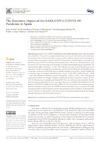Please use this identifier to cite or link to this item:
https://accedacris.ulpgc.es/jspui/handle/10553/107170
| Title: | The economic impact of the SARS-CoV-2 (COVID-19) pandemic in Spain | Authors: | Pinilla Domínguez, Jaime Barber Pérez, Patricia Lucía Vallejo Torres, Laura Rodríguez Mireles, Silvia González Lopez-Valcarcel, Beatriz Serra Majem, Luis |
UNESCO Clasification: | 32 Ciencias médicas 3212 Salud pública |
Keywords: | Bayesian Structural Time Series Covid-19 Economic Impact Spain Uncertainty |
Issue Date: | 2021 | Journal: | International Journal of Environmental Research and Public Health | Abstract: | Background: The COVID-19 pandemic has hit both the Spanish economy and the popula-tion’s health hard. The result is an unprecedented economic and social crisis due to uncertainty about the remedy and the socioeconomic effects on people’s lives. Methods: We performed a retrospective analysis of the macroeconomic impact of the COVID-19 pandemic in 2020 using key indicators of the Spanish economy for the 17 Autonomous Communities (ACs) of the country. National statistics were examined in the search for impacts or anomalies occurring since the beginning of the pandemic. To estimate the strength of the impact on each of the indicators analyzed, we used Bayesian structural time series. We also calculated the correlation between the rate of GDP decline during 2020 and the cumulative incidence of COVID-19 cases per 100,000 inhabitants in the ACs. Results: In 2020, the cumulative impact on the gross domestic product was of −11.41% (95% credible interval: −13.46; −9.29). The indicator for business turnover changed by −9.37% (−12.71; −6.07). The Spanish employment market was strongly affected; our estimates showed a cumulative increase of 11.9% (4.27; 19.45) in the rate of unemployment during 2020. The worst indicators were recorded in the ACs most economically dependent on the services sector. There was no statistical association between the incidence of COVID-19 in 2020 and the fall in GDP in the ACs. Conclusions: Our estimates portray a dramatic situation in Spain, where the COVID-19 crisis has had more serious economic and health consequences than in other European countries. The productive system in Spain is too dependent on sectors vulnerable to the pandemic, and it is necessary to design and implement pro-found changes through the European Next Generation program. | URI: | https://accedacris.ulpgc.es/handle/10553/107170 | ISSN: | 1661-7827 | DOI: | 10.3390/ijerph18094708 | Source: | International Journal of Environmental Research and Public Health [ISSN 1661-7827], v. 18 (9), 4708, (Mayo 2021) |
| Appears in Collections: | Artículos |
SCOPUSTM
Citations
49
checked on Jun 8, 2025
WEB OF SCIENCETM
Citations
49
checked on Jan 25, 2026
Page view(s)
375
checked on Jan 16, 2026
Download(s)
246
checked on Jan 16, 2026
Google ScholarTM
Check
Altmetric
Share
Export metadata
Items in accedaCRIS are protected by copyright, with all rights reserved, unless otherwise indicated.
